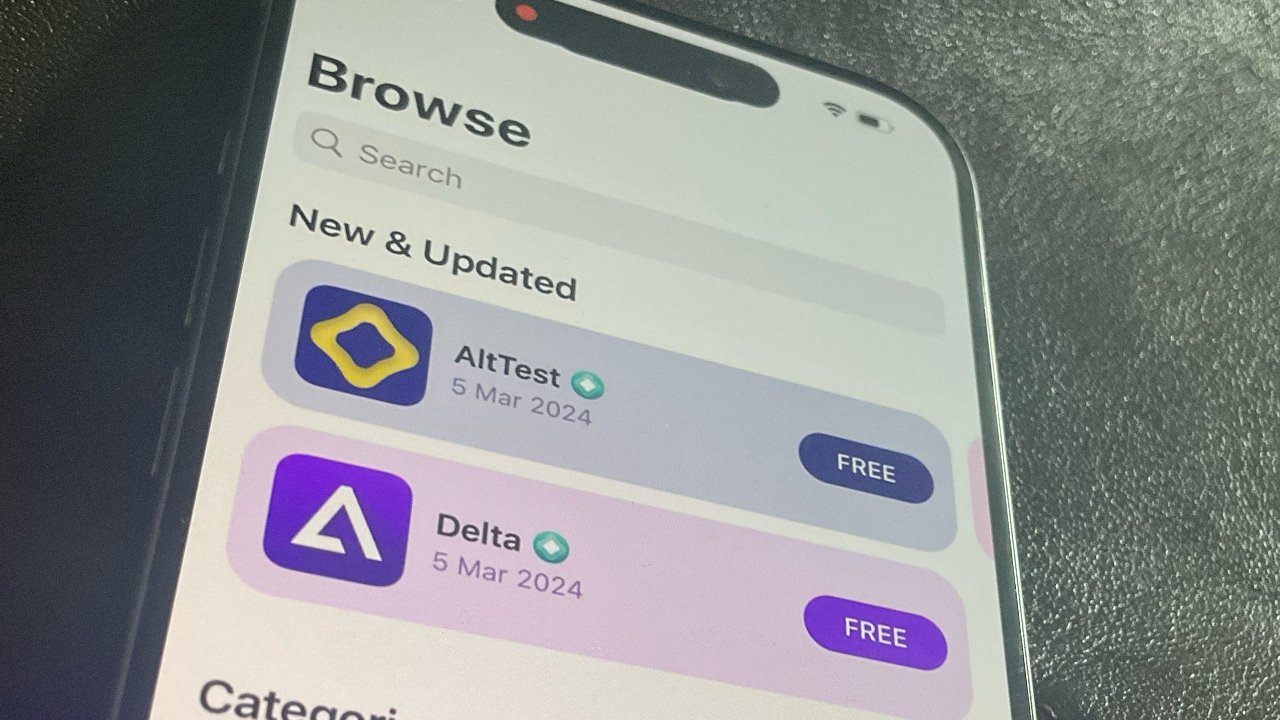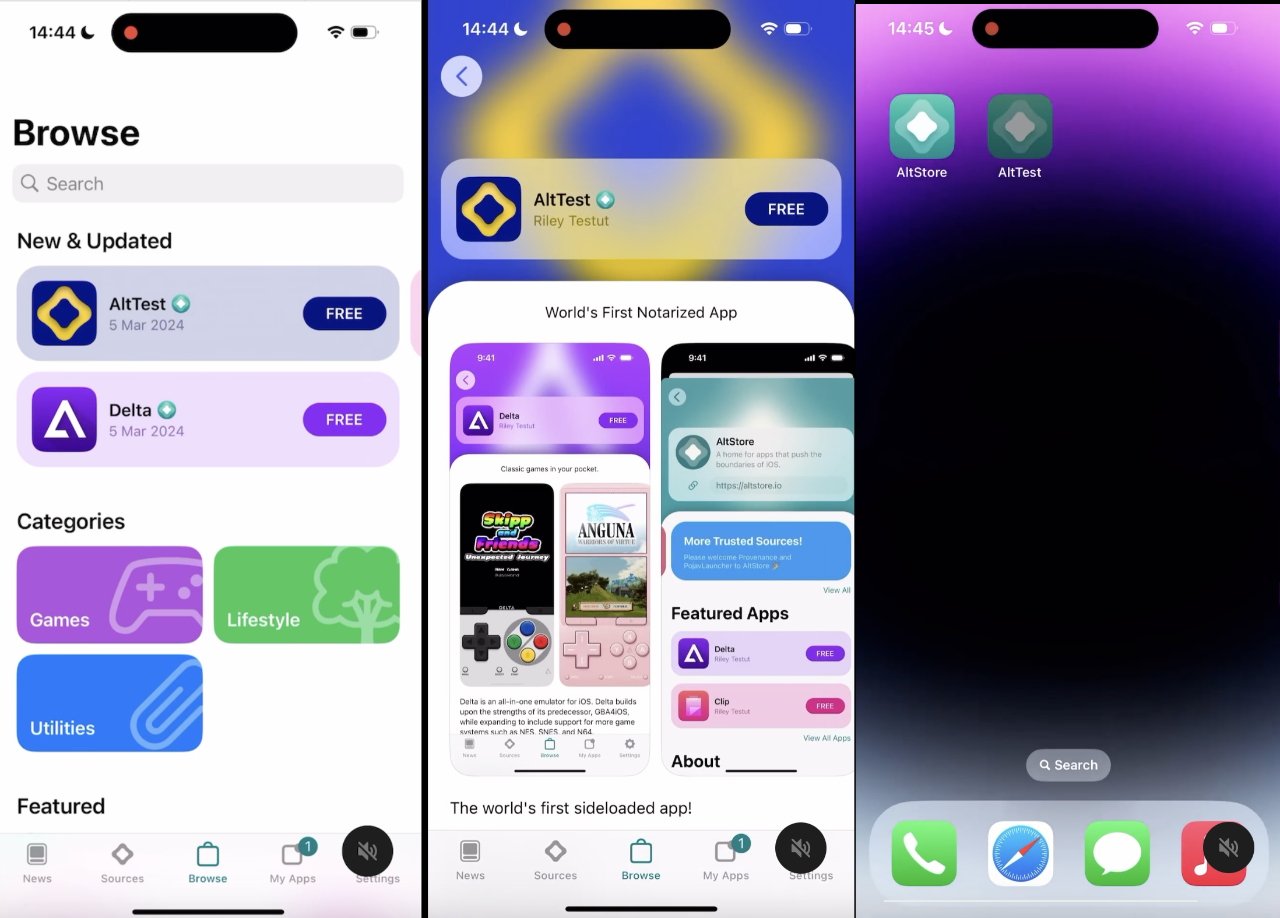How third-party App Stores will look to users in the EU
While EU users wait for the launch of new third-party app stores for the iPhone, the developer behind AltStore has demonstrated how they will all work.

AltStore's forthcoming third-party app store
While not all the details or ramifications are yet worked out, Apple does now have to allow third-party companies to launch their own App Stores. Apple has to approve each new App Store, though, and while its developers wait for that, AltStore has shown off how its sideloading store will work.
In a screen animation posted to Threads, AltStore is shown displaying a very Apple App Store-like catalog off apps.
Then when a user makes a selection, the animation shows it being downloaded. The example shown is a free app, so there are no details shown of how initial or in-app purchase prices will be displayed.
It also doesn't show the extra steps needed when first installing AltStore's app store. The initial link to the new app store will be on a website, and clicking it will take users through a couple of warning screens.
The warnings concern how Apple is not responsible for refunds on items bought in other stores. And it cautions that users' data is going to a third-party firm.

Three example screens showing how new third-party app stores could display items
So to use this newfound freedom in the EU, users have to first get the store, confirm they want it, then select items, and finally install apps from there.
Only, before a user does any of this, they have to know about an app they are interested in. They have to know it exists, they have to know which third-party app store it's on, and then they have to go through these steps.
All of this adds steps to buying apps, and makes the process feel more tedious than iOS users are used to.
Since the App Store began, it's been a pre-installed part of iOS, so users haven't had to download anything before looking for apps. They just tap on the App Store, and are presented with millions of apps to choose from.
AltStore has an existing niche userbase that is familiar with sideloading game emulators, so they will find the process straightforward. But neither AltStore nor any other third-party firm will provide the range of Apple's App Store, so potentially users will face multiple app stores and have to repeat these extra steps for each one.
It's going to be when Epic Games or other similarly well-known firms open a store, that will test how readily users adopt the new systems.
Separately, Epic Games has committed to launching a store. Despite originally blocking the "Fortnite" maker from having an EU iOS developer account, Apple was forced by the European Union to allow it afterall.
Read on AppleInsider

Comments
People already navigate different digital store processes with ease. App Stores are no different.
Some people say they will never even use a third party store. For those that do, it will be like setting up an account for any other paid service and let's not forget, they had to go through similar stages to get on the App Store.
The only significant, yet still very tiny but very vocal folks, those who have some key regulator's phone numbers and deposit codes on their iPhone, are not really part of Apple's massive customer base. They are wolves that have been circling Apple's neatly assembled and eager to spend massive customer base. They have long been licking the wounds of their own failures and salivating at the thoughts of gaining access to the Apple's massive and captive-by-choice customer base. But only if it's done on their own terms and own self interests. In a free market economy unfettered by loser-loving regulators, they would not have a leg to stand on. Did they assemble a massive customer base by building a series of incredibly integrated amazing products? Um, no. Did they invest the several billions of dollars and huge number of resources and infrastructure needed to keep a massive customer base constantly delighted and properly supported? No on that one too. They just saw this massive customer base of loyal Apple customers and convinced themselves and their friendly regulators that somehow that massive pool of people who are totally plugged into Apple's products and services somehow just magically appeared, like manna from heaven, and are ripe for the picking, except for the tiny hitch that Apple stands guard over its loyal customers. They had to force Apple to break the promises that Apple has made made to their customers. And they succeeded in the EU.
If the massive assemblage of Apple customers were asked whether they wanted to allow a tiny group of miscreants to break a vital piece of what Apple has created and supported the answer would be overwhelmingly NO. NFW. But somehow a tiny few hangers-on who couldn't have all of their demands met in a cooperative way by Apple have succeeded in overriding a part of Apple's safeguards and quality of service expectations, something that Apple has spent nearly two decades to create and sustain. None of this was done to satisfy the wishes of the overwhelming majority of Apple customers. It was done to allow a tiny number of ne're-do-wells who cannot do for themselves even a minuscule fraction of what Apple has done for billions, i.e., enjoy overwhelming financial success and loyalty by building amazing products and services.
So why should anyone expect that these unwelcome intruders are going to see an economic boon for what they have forced on a massive customer base that didn't want them to ply their wares outside of the privacy, security, integrity, and reliability protections that Apple has delivered for so long? The massive number of Apple stakeholders didn't get to vote on this. Nope, it was decided to satisfy the selfish desires of an overwhelming minority of people who want to ride on Apple's hard earned success. Sure, they'll get a few takers, but nothing remotely close to the number of customers who will continue to place their trust in Apple. Their tiny success, if it comes to fruition, will be insignificant compared to the damage they have done. They deserved nothing and hopefully that's exactly what they will get. On a more positive note, if you're a parent who's been eagerly waiting for your children to rack up thousands of your dollars buying virtual game tokens without asking for your consent, your ship has finally come in. Happy sailing!